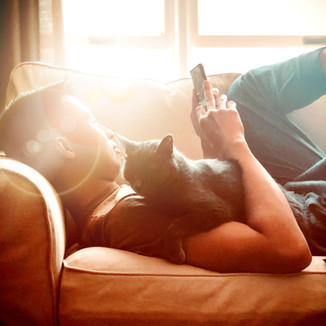Online Therapy Is Not The Wave Of The Future, It Is Now
- Erica L. Wilcox, LPC
- Aug 3, 2020
- 5 min read
Updated: Dec 23, 2020
You wear many hats.
You have a career, you are a parent, you are a friend, a son/daughter, a leader, an organizer, a planner.
You know how to show up for others and to get it done.
You can remember the mornings when you were rushing out of your front door for work with five bags in hand.
The struggle of cross referencing your social/family calendar before confirming your next meet up with your friends that you haven’t seen in a while.
The exhaustive collapse onto your bed at night, thinking back on your whirlwind of a day.
You asked yourself, do I even remember what I ate today?
You tell yourself, tomorrow I am going to do something for me for once, but the next day comes around and you realized that it felt impossible to even take a walk for yourself as if this were a radical act of self-care.
You convinced yourself that you were leading the ever-elusive “balanced life” that is so widely preached and sought after.
You were busy, so busy.
COVID has changed so much in your life.

You have found yourself vacillating between moments of “I’ve got this” to “I’ve got nothing.”
Now, you are facing an entire new set of scheduling and time management challenges and self-care, once again, is an after-thought.
You have begun to appreciate the convenience of online meetings, doctors appointments, and even social Zoom game night.
A large part of you is anxious about the thought of returning to “business as usual” and being bombarded with that age-old feeling like you are always racing the clock to “fit it all in.”
Buried beneath all of your roles are feelings of anxiety, depression, and overwhelm that, despite your ability to try to stay on top of things, you never really have addressed or gotten to the bottom of.
You’ve considered going to therapy to focus on your mental health, but who has time for that?
When you add it all up, the time to commute to and from a therapist’s office, and the actual therapy session time, it feels like scheduling Tetris, which leaves you feeling more overwhelmed and defeated.
It doesn’t have to be that way.
Seeing a therapist to help you focus on yourself (for once) doesn’t have to be inconvenient or stressful.
Video therapy is a way that you can work on yourself, at a time and pace that works for you, and takes the hassle of commuting and figuring out who is going to run the show when you are working on yourself.
Imagine being able to wake up, make your first cup of coffee, and hop online in your favorite chair, for your morning power hour of self-care with a therapist who is there to listen, support, and lead you through the tough stuff.
Imagine taking your hour-lunch break from work and connecting via video with a professional who is dedicated to your well-being and can give you real-life solutions to real-life problems.
Imagine taking a walk outside for an hour while you talk to your therapist over the phone and practice mindful movement to help center yourself so you can continue to lead your life?
Think of online therapy as a personal trainer for your brain that shows up at your door with a water bottle, towel, and some weights, ready to get you strong and healthy!
Video therapy is not the wave of the future. It is now. Unlike life, video therapy is not very complicated either. You need four things to help make video therapy successful:
1) A device such as a computer, laptop, tablet, or phone
2) A private space to virtually meet with your therapist
3) One hour during your day
4) A commitment to taking this short amount of time for yourself.
P.S. Sweatpants and pets are welcomed! Just be yourself.
Most people who are hesitant to start online therapy are concerned about two things:
1) Privacy
2) Being able to truly connect with their therapist via video.
First, licensed mental health professionals follow the same ethical codes and laws virtually as they do in person.
When we meet with you via secure video, we ensure that the physical space on our end is also private, secure, and free of distractions. The team of therapists at Wilcox Wellness use HIPPA compliant, safe, and secure video platforms and follow the best practices for providing online therapy set forth by the main governing bodies for therapists (such as the ACA, APA, and EMDRIA). We cannot do this work together if it is not private, secure, and confidential.
Our team of therapists at Wilcox Wellness has gotten very creative during COVID on ways to maintain privacy for video therapy, especially when there is a full house of family members.
Sometimes, as our client, this means having a video session from your car on your tablet or phone.
Sometimes this means making your own “Do Not Disturb” sign on your door, placing a sound machine outside of the room, and making an announcement to your family that you are not available for the next hour.
We have found, as therapists, that we feel just as connected with our clients via video as we did in person.
We love getting creative on ways to feel more virtually connected and continually receive a lot of positive feedback from our clients that the feelings are mutual.
We love thinking outside of the box, and video therapy allows us to do this even more.
An example of this is at the start of each session, a therapist and client will each light a candle to create a container for the session.
The candles will burn during the hour and then the therapist and client blow them out together as part of a closing meditation exercise.
We also have found that being able to work with our clients in their own spaces and for them to see our virtual office space has created a deeper sense of connection as well.
Wilcox Wellness is a virtually-based team of mental health and wellness experts providing innovative counseling for children, teens, couples, and adults.
We make video-therapy especially convenient and effective for our clients because of our wide range of types of therapy specializations such as:
Cognitive Behavioral Therapy,
EMDR,
Mindfulness Based Stress Reduction,
Solution-Focused Therapy, and
Therapy for Spanish-speaking individuals.
Because we do not have to commute to an office either, we are able to see our clients during “off-peak” hours, including weekends.
Our decades of continued training and education coupled with our down-to-earth personalities allow us to form genuine, connected, and compassionate relationships with our clients.
We help hurting people heal.
.png)

















Comments